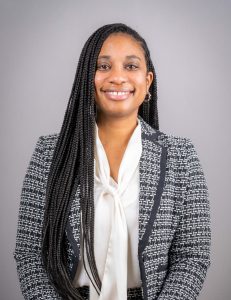By Michelle Gunter
When I joined the University of Baltimore School of Law in January 2023, I knew I had committed to a unique and dynamic institution. After a decade working in higher education at public and private institutions, I have seen many changes in how we approach students, the admissions process, and legal education itself. While some changes can be good, others have created challenges that require us to reimagine how we approach admissions.
 Since 1925, the School of Law has produced thousands of leaders for our city, state and nation. While the face of the legal field is always changing, from the integration of artificial intelligence to cybersecurity regulation, the goals of our applicants – and UBalt Law — remain the same. Our law school is increasingly reflective of the communities we serve, and it’s exciting to see how this impacts legal education and the legal profession.
Since 1925, the School of Law has produced thousands of leaders for our city, state and nation. While the face of the legal field is always changing, from the integration of artificial intelligence to cybersecurity regulation, the goals of our applicants – and UBalt Law — remain the same. Our law school is increasingly reflective of the communities we serve, and it’s exciting to see how this impacts legal education and the legal profession.
Today, our students come through the door with challenges that affect how we approach admissions and legal education. They experienced much of their education during the COVID-19 pandemic. As a result, they didn’t have the same access to internships, practical experiences and in-person education. Their resumes aren’t as full as those of past applicants, and confidence is lagging. Many struggle with anxiety and other mental health issues.
As undergraduate education removed SAT and ACT requirements, students arrive less experienced with standardized tests. Yet, with all of these differences between our applicants and our alumni, our students have meaningful life experiences and diverse perspectives that bring passion to their academic work.
With the introduction of the GRE as a widely used admissions exam, and the online version of the LSAT being offered more than four times a year, the admissions process adapts to these changes. As we face new challenges in fulfilling diversity goals, we continue to refine our processes to ensure success.
Despite the recent Supreme Court ruling on affirmative action, we will continue enrolling classes that reflect our diverse community. We will continue to develop lawyer-leaders who change our communities for the better. Our classes are more diverse than ever before. The entering class for Fall 2023 is approximately 43 percent diverse. This represents an increase of almost 20 percent since 2013.
More women have decided to take the law school journey. Just 10 years ago, our student body was primarily male. Today, our enrollment is over 60 percent women.
Our entering class arrived at August orientation representing 30 states and 114 undergraduate institutions. While the majority of our class still hails from Maryland, they are bringing worlds of experience to our classrooms. With a new group of students come new opportunities. More and more students are first-generation, and they are eager to explore the varied landscape of the legal field. In this new world, they will require mentorship from practicing lawyers who remember their own journey through law school.
As the new class gets acclimated, my Admissions team and I will travel the country recruiting new students, talking about the phenomenal experiences each student will gain, and the alumni connections that will support them along the way. Technology allows us to reach students who might otherwise know very little about UBalt Law, expanding our reach in important ways.
As you cross paths with our prospective students and current students in your travels, we ask that you point them in the right direction. Provide the help and support you needed when you were in law school. Along with you, we look forward to what the next generation of lawyers will bring.
Michelle Gunter, Esq., is assistant dean for admissions and enrollment management at the University of Baltimore School of Law.
